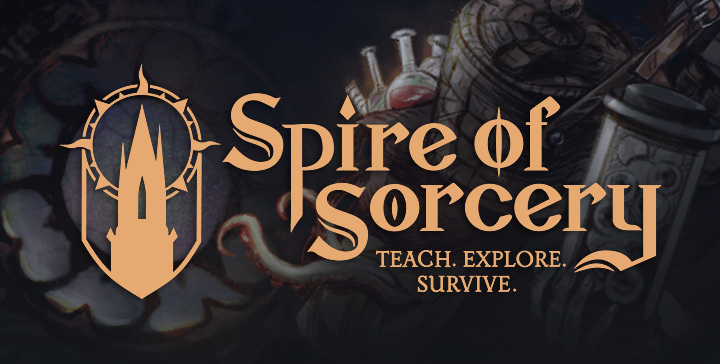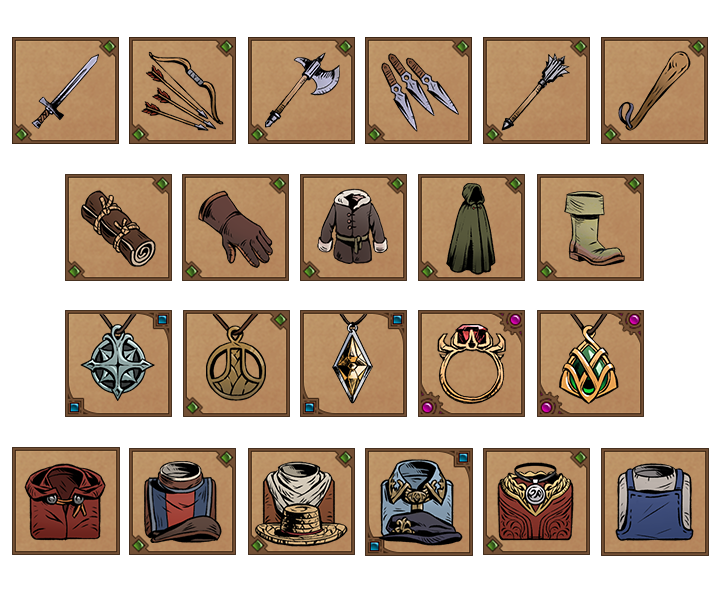#43 – INVENTORY

Another week, another blog post!
Today, let’s dive into the system of inventory management.
DIFFERENT TYPES OF INVENTORY ITEMS
Spire of Sorcery has hundreds of different inventory items, and it took us some time to understand how to organize them properly. At first, we had such groups as “Minerals” and “Jewelry”, but then we realized that it’s not what we need when we play. What we really need is to have groups based on how different items are used, such as “Resources for Crafting”, “Resources for Alchemy”, “Artifacts” and so on.
An important part of this concept is that certain items may belong to more than one group: for example, “Infinite Backpack” belongs both to “Artifacts” and to “Equipment”, while “Fat of Tasljuk” belongs both to “Food Items” and “Resources for Alchemy”.
Here’s the current list of item groups:
ːnotebookː EQUIPMENT
This large group includes weapons (such as swords, daggers and axes as well as bows and crossbows), armor (helmets and shields), travel equipment (winter gloves and travel boots, backpacks, warm coats, sleeping bags and so forth), accessories (amulets, rings, diadems – whether invested with magic or not) and clothing sets (different social groups in Rund wear different types of clothing on formal occasions, we currently have about a dozen of different sets).

The key characteristic of this group is that such items only have effect when they are worn, and there are certain limitations to how you can wear them. For example, to benefit from warm boots, a character has to actually wear them (and not just carry them in her backpack) – and, obviously, one character cannot wear two or three pairs of boots at the same time.
ːnotebookː BOOKS & SCROLLS
This is the most straightforward group of items in Rund: if you can read it, then it’s a book or a scroll.

ːnotebookː POTIONS
This group includes items crafted through alchemy: various potions, ointments and powders that can be as common as a stinking ointment used to prevent insect bites – or as rare as the Potion of Intelligence which temporarily increases one of character’s stats.

ːnotebookː ARTIFACTS
Some of the books, potions or equipment items can also be artifacts. Such items exist in a singular number and belong to the “unique” rarity level. This includes both “fancy” pieces such as rings and amulets invested with special powers and “mundane” items such as boots and cloaks enhanced with magic.

ːnotebookː FOOD
This group includes both raw food (mushrooms and berries, vegetables, fish, meat and other items that can be consumed raw) and cooked food (various food rations).

ːnotebookː RESOURCES – CRAFTING
When an item has this attribute, it means that it can be used in Workshop to craft another item. This group includes a lot of things, from minerals and metals to furs and other animal products.

ːnotebookː RESOURCES – ALCHEMY
This group includes all the items that can be used in Alchemical Studio to create potions, ointments and powders. It can be an emerald, or it can be a fruit of the Death Flower tree, or it can be mermaid’s tentacles.

ːnotebookː RESOURCES – COOKING
Finally, this group includes everything that can be used in Kitchen to cook food rations: from raw meat and raw fish to salt and spices.

KEEPING AND CARRYING INVENTORY ITEMS
Each item has one value that reflects both its weight and size. We currently call it “weight” as a compromise. Correspondingly, each character has a “capacity” that reflects how much “weight” such character can carry. And in the Spire, your Warehouse has the capacity that reflects how much weight it can store.
Spire’s Warehouse can be expanded to allow for more storage room, and a character can be equipped with a backpack to allow her or him to carry more items.
Some characters have traits that increase or decrease their default capacities (“hardy” and “weak”, but also “one-legged” and “one-armed”) and certain states (“wounded”) may also affect character’s current capacity.
Capacity of a party matters because an overloaded party receives a penalty to its speed of movement and Travel Magic comes handy because certain spells can increase the capacity of a character (temporarily) or, for a time, nullify a specific item’s weight (“levitation” is how you normally move heavy chests to the Spire).

HOW DO YOU EQUIP A CHARACTER?
In Spire of Sorcery, you cannot micro-manage your characters. You can give someone a warm winter cloak, but you cannot make them wear it – it’s always their decision.
Moreover, when you send a party out on a quest, the party has a shared inventory. You cannot control who gets to carry this, or who gets to wear that – these are the decisions made by the party’s leader (whom you appoint, however).
As we mentioned above, there’s no “hard limit” on how much weight a party can carry – there’s just an increasing penalty to the party’s speed of movement. Because of this, certain party leaders may make a decision to drop items in order to increase their speed (while other leaders, especially those with the trait “greedy”, will keep everything that they find, even if it means a very slow crawl across the map).

And this is it for today! Don’t forget that we run a live stream with the current version of the game every Friday at 1600 (Vilnius time), and if you missed one of those, you can watch (or just fast-forward) the recordings over on our YouTube channel.
See you next week!
–––

ːsummer_magicː Spire of Sorcery – Character Generator (Steam)
ːsummer_magicː Official Discord server
ːsummer_magicː YouTube recordings of the development live streams
ːsummer_magicː Twitter (game updates)
ːsummer_magicː Facebook (game updates)

ːmaliceː Official Discord server
ːmaliceː Twitter (game updates)
ːmaliceː Facebook (game updates)
ːmusicː Original Soundtrack on Spotify

ːnotebookː Charlie Oscar’s developer page on Steam
ːnotebookː Twitter (studio news)
ːnotebookː Facebook (studio news)
ːnotebookː "Behind the scenes" Instagram
ːnotebookː YouTube